20 aug 2018

Gilad Erdan
Under reform, applicants who served in IDF combat roles and most officers will no longer need to prove necessity in order to receive a gun license; 'In an era of lone-wolf terror attacks, the more armed civilians there are, the larger the chances of disrupting an attack,' Erdan says.
Minister of Public Security Gilad Erdan approved a change in gun licensing policy that will make it easier for hundreds of thousands of Israeli citizens who have served in IDF combat roles (Rifleman 07 and above) to obtain a firearm license.
The change will allow more than 600,000 people to apply for a gun license, conditional on a satisfactory declaration of health and a police permit. Heretofore, even those who served in IDF combat roles could generally only obtain a gun license if they lived across the Green Line or worked in a security-related position.
In addition, Erdan also decided to allow all commissioned officers from the rank of lieutenant and non-commissioned officers from the rank of master sergeant to carry a weapon even after they complete their reserves service.
“Many civilians have saved lives during terror attacks. In an era of lone-wolf terror attacks, the more armed and trained civilians there are, the larger the chances of disrupting an attack and decreasing casualties,” the minister said.
Erdan also approved reforms that are meant to improve the vetting process for new applicants as well as for existing permit holders.
Volunteers at certain positions in the police force, as well as members of MDA and other emergency medical services, will also be eligible to carry a firearm under the new policy.
Another change, aimed at those possessing a license for private firearms lawfully and continuously for 10 years or more, is that they may continue to carry their weapon, even without further proof of compliance with the test.
Under reform, applicants who served in IDF combat roles and most officers will no longer need to prove necessity in order to receive a gun license; 'In an era of lone-wolf terror attacks, the more armed civilians there are, the larger the chances of disrupting an attack,' Erdan says.
Minister of Public Security Gilad Erdan approved a change in gun licensing policy that will make it easier for hundreds of thousands of Israeli citizens who have served in IDF combat roles (Rifleman 07 and above) to obtain a firearm license.
The change will allow more than 600,000 people to apply for a gun license, conditional on a satisfactory declaration of health and a police permit. Heretofore, even those who served in IDF combat roles could generally only obtain a gun license if they lived across the Green Line or worked in a security-related position.
In addition, Erdan also decided to allow all commissioned officers from the rank of lieutenant and non-commissioned officers from the rank of master sergeant to carry a weapon even after they complete their reserves service.
“Many civilians have saved lives during terror attacks. In an era of lone-wolf terror attacks, the more armed and trained civilians there are, the larger the chances of disrupting an attack and decreasing casualties,” the minister said.
Erdan also approved reforms that are meant to improve the vetting process for new applicants as well as for existing permit holders.
Volunteers at certain positions in the police force, as well as members of MDA and other emergency medical services, will also be eligible to carry a firearm under the new policy.
Another change, aimed at those possessing a license for private firearms lawfully and continuously for 10 years or more, is that they may continue to carry their weapon, even without further proof of compliance with the test.

An Israeli settler declared intention to perform his marriage ritual in al-Aqsa Mosque, violating a longstanding agreement between Jordan and Israel.
In violation of the agreement which prevents non-Muslim religious rituals at the al-Aqsa compound, Avraham Bloch, a member of the so-called The Temple organization, published on Sunday a photo while holding a wedding countdown plaque.
The plaque indicates that only one day is left for the marriage.
While Jewish visitation is permitted to the compound, non-Muslim worship at al-Aqsa is prohibited according to an agreement signed between Israel and the Jordanian government after Israel’s illegal occupation of East Jerusalem in 1967.
Despite the agreement with Jordan, Israeli authorities regularly allow Jewish settlers to enter the site, often under armed guard. Such break-ins are typically made by right-wingers attempting to unsettle the status quo at the site, and coincide with restrictions on Palestinian access, including bans on entrance and detentions.
In violation of the agreement which prevents non-Muslim religious rituals at the al-Aqsa compound, Avraham Bloch, a member of the so-called The Temple organization, published on Sunday a photo while holding a wedding countdown plaque.
The plaque indicates that only one day is left for the marriage.
While Jewish visitation is permitted to the compound, non-Muslim worship at al-Aqsa is prohibited according to an agreement signed between Israel and the Jordanian government after Israel’s illegal occupation of East Jerusalem in 1967.
Despite the agreement with Jordan, Israeli authorities regularly allow Jewish settlers to enter the site, often under armed guard. Such break-ins are typically made by right-wingers attempting to unsettle the status quo at the site, and coincide with restrictions on Palestinian access, including bans on entrance and detentions.
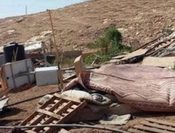
Israeli soldiers, accompanied by a number of illegal colonialist settlers, invaded a Palestinian land, Monday, removed a tent and assaulted a man, in Masafer Yatta area, south of Hebron, in the southern part of the occupied West Bank.
Rateb Jabour, the coordinator of the Popular Committee against the Annexation Wall and colonies, said the soldiers and colonialist settlers, removed a residential tent, owned by Yousef Abu Arram, and illegally confiscated wound meant for renovating a room used as a residence by the man and his family.
Jabour added that the colonists attempted to occupy the room, while the soldiers assaulted Bassel Mohammad Abu Arram, causing various cuts and bruises.
Rateb Jabour, the coordinator of the Popular Committee against the Annexation Wall and colonies, said the soldiers and colonialist settlers, removed a residential tent, owned by Yousef Abu Arram, and illegally confiscated wound meant for renovating a room used as a residence by the man and his family.
Jabour added that the colonists attempted to occupy the room, while the soldiers assaulted Bassel Mohammad Abu Arram, causing various cuts and bruises.
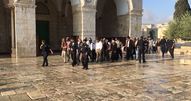
New groups of Israeli settlers broke into al-Aqsa Mosque on Monday morning via al-Maghareba Gate.
Local sources reported that 50 Israeli settlers forced their way into the Mosque amid heavy police presence.
They said that other groups of settlers are expected to visit the site later in the day.
Israeli settlers carry out almost daily break-ins into al-Aqsa Mosque under the police protection especially in the early morning hours taking advantage of the small number of Palestinian worshipers in the Mosque during this period.
Local sources reported that 50 Israeli settlers forced their way into the Mosque amid heavy police presence.
They said that other groups of settlers are expected to visit the site later in the day.
Israeli settlers carry out almost daily break-ins into al-Aqsa Mosque under the police protection especially in the early morning hours taking advantage of the small number of Palestinian worshipers in the Mosque during this period.
19 aug 2018
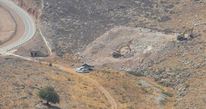
Israeli settlers, under the protection of Israeli occupation forces, on Sunday razed Palestinian-owned lands in Ras Karkar village, west of Ramallah.
Local sources reported that scores of Israeli settlers in the early morning hours of Sunday brought bulldozers to Ras Karkar and started to level Palestinian lands in the area.
Anti-settlement activist Ayed Mazloum said that the bulldozed lands are owned by the families of Nofal, Abu Fkheida, and Samhan who have not received any official order to confiscate their lands.
Quoting Mazloum, Quds Press said that the razing operation was halted after the residents of Ras Karkar rallied to resist the settler attack.
The Palestinian activist added that in case a confiscation order is issued against the lands, Ras Karkar residents will not stand idly by, pointing out that the families of Ras Karkar and the neighboring villages have already started to march in the targeted lands to support their owners.
Local sources reported that scores of Israeli settlers in the early morning hours of Sunday brought bulldozers to Ras Karkar and started to level Palestinian lands in the area.
Anti-settlement activist Ayed Mazloum said that the bulldozed lands are owned by the families of Nofal, Abu Fkheida, and Samhan who have not received any official order to confiscate their lands.
Quoting Mazloum, Quds Press said that the razing operation was halted after the residents of Ras Karkar rallied to resist the settler attack.
The Palestinian activist added that in case a confiscation order is issued against the lands, Ras Karkar residents will not stand idly by, pointing out that the families of Ras Karkar and the neighboring villages have already started to march in the targeted lands to support their owners.
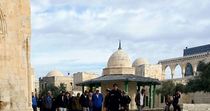
Dozens of Israeli settlers and intelligence officers forced their way into al-Aqsa Mosque on Sunday morning under the protection of Israeli police.
Spokesman for Jerusalem's Islamic Awqaf Department Feras al-Dibs said that the Israeli police in the early morning hours deployed their forces in al-Aqsa courtyards in preparation for the scheduled visit.
Al-Dibs told Quds Press that 82 Israeli settlers entered the Mosque, roamed its courtyards, and performed Talmudic rituals near the Dome of the Rock.
He added that seven Israeli intelligence officers broke into the Mosque during the same period.
Al-Aqsa Mosque was closed late on Friday and Palestinian worshipers were prevented from performing evening prayers in the holy site following an alleged stabbing attack near the Mosque.
A Palestinian young man identified as Ahmad Mahamid, from Umm al-Fahm city in the 1948 occupied Palestine, was shot dead at al-Majles Gate near al-Aqsa Mosque for allegedly attempting to stab an Israeli soldier.
Spokesman for Jerusalem's Islamic Awqaf Department Feras al-Dibs said that the Israeli police in the early morning hours deployed their forces in al-Aqsa courtyards in preparation for the scheduled visit.
Al-Dibs told Quds Press that 82 Israeli settlers entered the Mosque, roamed its courtyards, and performed Talmudic rituals near the Dome of the Rock.
He added that seven Israeli intelligence officers broke into the Mosque during the same period.
Al-Aqsa Mosque was closed late on Friday and Palestinian worshipers were prevented from performing evening prayers in the holy site following an alleged stabbing attack near the Mosque.
A Palestinian young man identified as Ahmad Mahamid, from Umm al-Fahm city in the 1948 occupied Palestine, was shot dead at al-Majles Gate near al-Aqsa Mosque for allegedly attempting to stab an Israeli soldier.
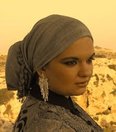
by Ramona Wadi
In less than three months, Jewish settlers have destroyed over 2,000 trees and grapevines in the occupied West Bank. Rights group B’Tselem has issued a detailed report on this destruction, including testimony from Palestinian farmers. Bales of hay and barley fields were also destroyed. The destruction wrought by Israel’s settler-colonists equates Palestinian agriculture to terrorism; slogans sprayed on Palestinian property following the destruction included “No to farmer terrorism”.
The personal testimonies show that Israel has once again refused to act in order to deter settler violence against Palestinians and their land. Ultimately, the aim is to displace Palestinians forcibly by terrorizing those seeking access to their own land. “This process has erected invisible walls throughout the West Bank, which Palestinians know crossing will expose them to violence and even danger to their lives,” says B’Tselem.
Israel is using complementary forms of violence: direct destruction by targeting crops and using the same destruction to levy a psychological threat against the colonized population. In the documented cases, the destruction was so severe that new plants have to be cultivated, thus having a negative impact on the sliver of economic independence that Palestinians can gain from agriculture.
There is an outcome of resilience mingled with imposed resignation; the farmers will still tend to their fields yet the threat of another round of settler violence fuelled by impunity is always imminent. No matter how well rights organizations document the violations, though, the Palestinians have no recourse other than awareness. This is partly because Israel has moved ahead in terms of normalizing colonial expansion.
Hassan ‘Issa discovered that 168 out of 250 grapevines in his fields had been destroyed by settlers. “What happened to my vines feels like a terrible injustice, and I feel incredibly frustrated and sad.” It is painful to read this. Compare the vagueness of ‘Issa’s statement — made in the knowledge that there are no rights for the colonized in apartheid Israel — with the threat left by the settlers: “No to farmer terrorism.”
The value of people and land is misplaced to set the accelerated pace for forced displacement and a re-enactment of the image of Palestine being barren, one of the false premises behind Palestine’s colonization by Israel. The only difference is that Israel now prefers sustained acts of violence that are documented and discussed almost routinely.
“Farmer terrorism” is, of course, a complete falsehood, yet it is on such premises that expansion has been facilitated. The more that Israel utilizes such absurd claims, the further it is removed from reprimand by the international community. This lends Israel ample time and space — and total immunity — to construct its variety of “terror” narratives to make such purported threats endemic to its settler-colonial presence. Why would anyone even seek to challenge the notion of “farmer terrorism”? At first glance, it is void of any logic; a second reading flaunts its depravity, embodied by state and settlers alike.
Palestinian resilience has always laid bare the Zionist myths. Having no other means to sustain itself, Israel is eager to create the conditions for myths to become a manifested reality, even if it means acknowledging Palestinian existence through accusations which serve to embellish its purported “security concerns”. Nothing, though, justifies the wanton destruction of crops by illegal Jewish settlers or anyone else.
– Ramona Wadi is an independent researcher, freelance journalist, book reviewer and blogger. Her article appeared in MEMO.
In less than three months, Jewish settlers have destroyed over 2,000 trees and grapevines in the occupied West Bank. Rights group B’Tselem has issued a detailed report on this destruction, including testimony from Palestinian farmers. Bales of hay and barley fields were also destroyed. The destruction wrought by Israel’s settler-colonists equates Palestinian agriculture to terrorism; slogans sprayed on Palestinian property following the destruction included “No to farmer terrorism”.
The personal testimonies show that Israel has once again refused to act in order to deter settler violence against Palestinians and their land. Ultimately, the aim is to displace Palestinians forcibly by terrorizing those seeking access to their own land. “This process has erected invisible walls throughout the West Bank, which Palestinians know crossing will expose them to violence and even danger to their lives,” says B’Tselem.
Israel is using complementary forms of violence: direct destruction by targeting crops and using the same destruction to levy a psychological threat against the colonized population. In the documented cases, the destruction was so severe that new plants have to be cultivated, thus having a negative impact on the sliver of economic independence that Palestinians can gain from agriculture.
There is an outcome of resilience mingled with imposed resignation; the farmers will still tend to their fields yet the threat of another round of settler violence fuelled by impunity is always imminent. No matter how well rights organizations document the violations, though, the Palestinians have no recourse other than awareness. This is partly because Israel has moved ahead in terms of normalizing colonial expansion.
Hassan ‘Issa discovered that 168 out of 250 grapevines in his fields had been destroyed by settlers. “What happened to my vines feels like a terrible injustice, and I feel incredibly frustrated and sad.” It is painful to read this. Compare the vagueness of ‘Issa’s statement — made in the knowledge that there are no rights for the colonized in apartheid Israel — with the threat left by the settlers: “No to farmer terrorism.”
The value of people and land is misplaced to set the accelerated pace for forced displacement and a re-enactment of the image of Palestine being barren, one of the false premises behind Palestine’s colonization by Israel. The only difference is that Israel now prefers sustained acts of violence that are documented and discussed almost routinely.
“Farmer terrorism” is, of course, a complete falsehood, yet it is on such premises that expansion has been facilitated. The more that Israel utilizes such absurd claims, the further it is removed from reprimand by the international community. This lends Israel ample time and space — and total immunity — to construct its variety of “terror” narratives to make such purported threats endemic to its settler-colonial presence. Why would anyone even seek to challenge the notion of “farmer terrorism”? At first glance, it is void of any logic; a second reading flaunts its depravity, embodied by state and settlers alike.
Palestinian resilience has always laid bare the Zionist myths. Having no other means to sustain itself, Israel is eager to create the conditions for myths to become a manifested reality, even if it means acknowledging Palestinian existence through accusations which serve to embellish its purported “security concerns”. Nothing, though, justifies the wanton destruction of crops by illegal Jewish settlers or anyone else.
– Ramona Wadi is an independent researcher, freelance journalist, book reviewer and blogger. Her article appeared in MEMO.
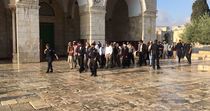
Jewish temple mount groups have incited their supporters and followers to participate in a mass Talmudic prayer on Sunday at the Aqsa Mosque.
The groups called for reciting loudly the Jewish prayers of repentance (Selichot), saying it was time for the Jews to perform such rituals at the Aqsa Mosque.
Selichot is communal Jewish hymns for forgiveness, and said at nightfall during the Hebrew holiday season or on Jewish fast days.
The groups called for reciting loudly the Jewish prayers of repentance (Selichot), saying it was time for the Jews to perform such rituals at the Aqsa Mosque.
Selichot is communal Jewish hymns for forgiveness, and said at nightfall during the Hebrew holiday season or on Jewish fast days.
|
|
Israeli settlers punctured and vandalized about 15 Palestinian-owned vehicles on Saturday in the Issawiya neighborhood, in occupied East Jerusalem.
Muhammad Abu al-Hummus, member of a local follow-up committee, said that Israeli settlers stormed the neighborhood from its north-east entrance and vandalized about 15 Palestinian-owned vehicles. Al-Hummus added that the Israeli settlers punctured the tires of the vehicles and spray painted racist, anti-Arab slogans on the neighborhood walls and on one of the vehicles. The racist slogans read “Arabs of Jerusalem are terrorists.” |
Al-Hummus called on the committees and institutions of Issawiya neighborhood to detain the Israeli settlers responsible for the vandalism.
Many Palestinian activists and rights groups have accused Israel of fostering a "culture of impunity" for Israelis committing violent acts against Palestinians.
Better known as "price tag" attacks, extremis Israeli settlers use violent acts of retribution on Palestinians and their property to demonstrate their opposition to Israeli restrictions on settlements and their outposts in the occupied West Bank.
The Israeli NGO B’Tselem reported that Israeli settlers' vandalism in the occupied West Bank is a daily routine and is fully backed by Israeli authorities.
B'Tselem said that “Israel benefits from the repercussions, as settler violence has gradually dispossessed Palestinians of more and more areas in the West Bank, paving the way for a state takeover of land and resources. This occurs because Palestinians avoid entering areas in which they have been attacked, usually close to settlements.
“As a result, extensive Palestinian farmland near settlements has been vandalized and neglected to such an extent that it yields poor crops, making it not worthwhile for the owners to risk their safety to get there. This process has essentially erected invisible walls throughout the West Bank, which Palestinians know crossing will expose them to violence and even danger to their lives,” according to B’Tselem.
Many Palestinian activists and rights groups have accused Israel of fostering a "culture of impunity" for Israelis committing violent acts against Palestinians.
Better known as "price tag" attacks, extremis Israeli settlers use violent acts of retribution on Palestinians and their property to demonstrate their opposition to Israeli restrictions on settlements and their outposts in the occupied West Bank.
The Israeli NGO B’Tselem reported that Israeli settlers' vandalism in the occupied West Bank is a daily routine and is fully backed by Israeli authorities.
B'Tselem said that “Israel benefits from the repercussions, as settler violence has gradually dispossessed Palestinians of more and more areas in the West Bank, paving the way for a state takeover of land and resources. This occurs because Palestinians avoid entering areas in which they have been attacked, usually close to settlements.
“As a result, extensive Palestinian farmland near settlements has been vandalized and neglected to such an extent that it yields poor crops, making it not worthwhile for the owners to risk their safety to get there. This process has essentially erected invisible walls throughout the West Bank, which Palestinians know crossing will expose them to violence and even danger to their lives,” according to B’Tselem.

A Palestinian father and his three kids suffered injuries on Saturday night when the vehicle they were aboard were attacked by a horde of Jewish settlers on a road south of Nablus city in the occupied West Bank.
Local sources said that Munder Mousa, a resident of Tulkarem, and his three kids were aboard his car on Huwara road, particularly at the junction of Yitzhar settlement, when settlers hiding behind trees popped out and embarked on hurling rocks at the car.
The settlers also used a vehicle to block the road before carrying out their assault, According to sources.
However, Mousa managed to drive away with his kids until he arrived in Madama town in southern Nablus where they were given first aid by a pharmacist before an ambulance came and evacuated them to Rafidia Hospital in Nablus.
Other Palestinian cars were also attacked by the same settlers in the area and sustained damage.
Israeli Colonizers Injure Four Palestinians Near Nablus
Local sources said that Munder Mousa, a resident of Tulkarem, and his three kids were aboard his car on Huwara road, particularly at the junction of Yitzhar settlement, when settlers hiding behind trees popped out and embarked on hurling rocks at the car.
The settlers also used a vehicle to block the road before carrying out their assault, According to sources.
However, Mousa managed to drive away with his kids until he arrived in Madama town in southern Nablus where they were given first aid by a pharmacist before an ambulance came and evacuated them to Rafidia Hospital in Nablus.
Other Palestinian cars were also attacked by the same settlers in the area and sustained damage.
Israeli Colonizers Injure Four Palestinians Near Nablus
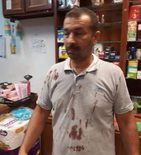
A number of Israeli colonizers from Yitzhar colony, illegally built on Palestinian lands south of the northern West Bank city of Nablus, hurled stones at several Palestinian cars, wounding four residents, and caused damage to many cars.
Media sources in Nablus said the attacks took place on the main road between the city and Qalqilia.
They added that the wounded Palestinians have been identified as Abdul-Hafith Mousa, and his sons Mohammad and Tareq, in addition to Mohammad Saleh Awad, from Tulkarem. They were rushed for treatment in Rafidia hospital, in Nablus.
Ghassan Daghlas, a Palestinian official who monitors Israel illegal colonialist activities in northern West Bank, said such assaults have witnessed a very serious escalation after a settler woman was killed in a traffic accident, last Thursday.
He added that Yitzhar colonists have carried out numerous assaults against the Palestinians, and closed the Nablus-Qalqilia road, in addition to causing damage to many cars and wounding many residents, including several children.
Daghlas stated that, in 48 hours, the Israeli assailants burnt a bulldozer, attacked many homes in ‘Aseera ash-Shamaliya town and Jaloud village, south of Nablus, in addition to cutting 900 trees in the al-Lubban ash-Sharqiya village, also south of Nablus, Arraba town, south of Jenin, and Ras Karkar village, northwest of Ramallah in central West Bank, and demolished a well.
He added that the colonists also wrote racist graffiti in al-‘Isawiya and Shu’fat, in occupied Jerusalem, and punctured tires of more than 15 Palestinian cars.
Media sources in Nablus said the attacks took place on the main road between the city and Qalqilia.
They added that the wounded Palestinians have been identified as Abdul-Hafith Mousa, and his sons Mohammad and Tareq, in addition to Mohammad Saleh Awad, from Tulkarem. They were rushed for treatment in Rafidia hospital, in Nablus.
Ghassan Daghlas, a Palestinian official who monitors Israel illegal colonialist activities in northern West Bank, said such assaults have witnessed a very serious escalation after a settler woman was killed in a traffic accident, last Thursday.
He added that Yitzhar colonists have carried out numerous assaults against the Palestinians, and closed the Nablus-Qalqilia road, in addition to causing damage to many cars and wounding many residents, including several children.
Daghlas stated that, in 48 hours, the Israeli assailants burnt a bulldozer, attacked many homes in ‘Aseera ash-Shamaliya town and Jaloud village, south of Nablus, in addition to cutting 900 trees in the al-Lubban ash-Sharqiya village, also south of Nablus, Arraba town, south of Jenin, and Ras Karkar village, northwest of Ramallah in central West Bank, and demolished a well.
He added that the colonists also wrote racist graffiti in al-‘Isawiya and Shu’fat, in occupied Jerusalem, and punctured tires of more than 15 Palestinian cars.
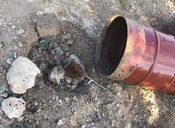
Illegal Israeli paramilitary colonizers uprooted, Saturday, dozens of Palestinian olive saplings, and cut trees, in Ras Karkar village, west of the central West Bank city of Ramallah.
The WAFA Palestinian News Agency said the Israeli assailants invaded lands, owned by Khaled Samhan, in the northern part of the village, and uprooted 70 olive saplings. Many of the saplings had been planted in barrels, which were overturned by the paramilitary colonizers. video
WAFA added that the attackers also cut many trees on his lands, and wrote racist graffiti on the large cement cover of an underground water reservoir.
On Saturday at dawn, another group of illegal colonizers cut dozens of Palestinian olive trees, owned by a local resident identified as Nathmi Dheidi, in ‘Arraba town, south of Jenin, in the northern part of the occupied West Bank.
The WAFA Palestinian News Agency said the Israeli assailants invaded lands, owned by Khaled Samhan, in the northern part of the village, and uprooted 70 olive saplings. Many of the saplings had been planted in barrels, which were overturned by the paramilitary colonizers. video
WAFA added that the attackers also cut many trees on his lands, and wrote racist graffiti on the large cement cover of an underground water reservoir.
On Saturday at dawn, another group of illegal colonizers cut dozens of Palestinian olive trees, owned by a local resident identified as Nathmi Dheidi, in ‘Arraba town, south of Jenin, in the northern part of the occupied West Bank.
